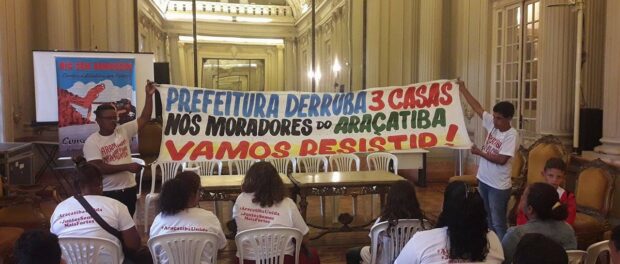
On the night of November 30, community leaders from across Rio converged at the City Council to speak out against evictions. The evening’s panel marked the launch of Rio’s first “Parliamentary Front Against Removals and Evictions,” and featured activists representing the neighborhoods of Horto, Barrinha, Rio das Pedras, Caetés and Araçatiba in Rio’s West Zone, and Indiana, Rádio Sonda, and Maracajás in the North Zone.
The event marked the first in a series of planned gatherings and marches against evictions, including occupation-style protests at Mayor Marcelo Crivella’s condominium on last Friday and at key city government sites in the coming weeks. The protesters are demanding a more open channel of communication between the mayor’s office and threatened communities, since the administration’s previous promises to schedule meetings with community leaders have not been fulfilled.
For many, the mayor has fallen short of his campaign slogan to “take care of the people.” “The only thing Crivella defends are his own interests,” said Araçatiba’s Ana Frimerman. Araçatiba, a small community located in the West Zone’s Guaratiba neighborhood, suffered its first bout of forced evictions two months ago. On October 3, Frimerman explained, “the City showed up and demolished three houses. That’s three families left homeless.” Recently, the City has threatened the community with fines over sewage in their surroundings, demanding R$15,000 (around US$5,000). “If none of Guaratiba has sewage treatment, why did they show up in its poorest area?” Frimerman pointed out.
Others from the West Zone raised similar concerns over the City’s interests and its justifications for eviction. Barrinha’s Jaqueline Andrade explained that the threat of removals facing her community has had nothing to do with illegal invasion of the land or precariousness of services. “We aren’t located in a nature reserve. We have energy. We have water. The problem is that our community is located right next to Barra da Tijuca, so we have all these construction and real estate companies eyeing us… We’re a poor community surrounded by a rich neighborhood.”
For participants across the entire panel, it seemed, the City is interfering in neighborhoods it had ignored until now.
Lorena Carvalho from Rio das Pedras explained that in her community’s 54 year history, “the City had never paid attention.” Families built their houses themselves, “one neighbor helping out another,“ she explained, but now the City “wants to come in and stomp us out, destroy our history.” Rio das Pedras, located in Rio’s inner West Zone between the neighborhoods of Itanhangá, Jacarepaguá, and Anil, was one of the few favelas specifically mentioned in the City’s Strategic Plan. Until recently, Rio das Pedras was to be turned upside down as part of a proposed “verticalization program” to remove residents and relocate them into yet-to-be-constructed towers in the same area, although community activists were concerned the tower apartments would be sold to new residents instead. Mayor Crivella has since backtracked in the face of widespread opposition, but residents are unconvinced. “He just changed the name [of the program],” said Carvalho. “They want to kick us out and sell [the land] to millionaires.”
Others echoed the bond between home and history. Ines Ferreira recounted that she had moved to the community of Indiana in 1974. She was 5 years old when she arrived, but the favela, located at the foot of the neighboring hillside favela of Borel in Rio’s North Zone, had existed since 1947. Her parents purchased a plot of land “full of spiders… scorpions” and started a life there. Recently, however, the City has developed plans to demolish houses and relocate Indiana’s residents further north to the neighborhood of Triagem. Now, she explained, Indiana receives a constant stream of visits from the City, reminding residents that their homes may soon be torn down.
The ceaseless threat of eviction is not unique to Indiana. Edivalma “Di” Sousa told the audience that Rádio Sonda and Maracajás have received eviction notifications every year since 1998. The two communities, both located on the edge of an Airforce base near Rio’s International Airport, share 60 years and 100 years of existence, respectively. Despite such history, the military has ordered residents to leave, “destroy their own homes, and not to leave a single scrap or rock behind.”
This recurrent abuse takes a massive psychological toll on favela residents across the city. Andrade reported depression spreading through Barrinha, and Ferreira rattled off a list of psychiatric medications her neighbors in Indiana have begun taking. Imagine seeing, she said, “your husband standing in the way of the tractor, protecting what he has built” with his own hands. When an eviction happens, she explained, “we don’t sleep, we don’t eat… we don’t feed our children right.”
In the face of escalating threats, and despite these challenges, the panel’s participants remained determined to resist. Many lauded the help they had received from the Public Defender’s Office, from the Catholic Church’s Pastoral das Favelas, and from other threatened communities. The Parliamentary Front made it clear on Thursday evening that as they prepare to launch this month’s series of protests, solidarity among the threatened communities would not be an issue. “We are stronger together,” Andrade reminded the audience.


